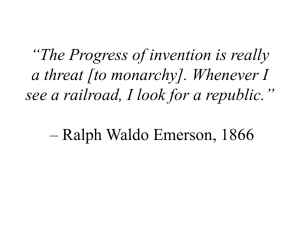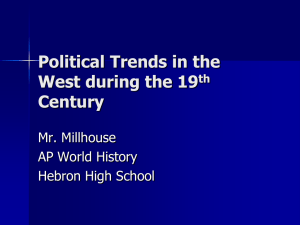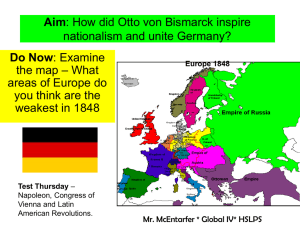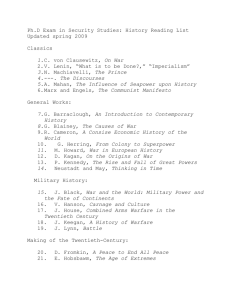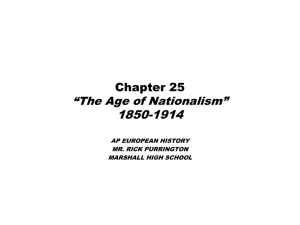Nationalism Study Guide: Origins, Movements, and Key Figures
advertisement
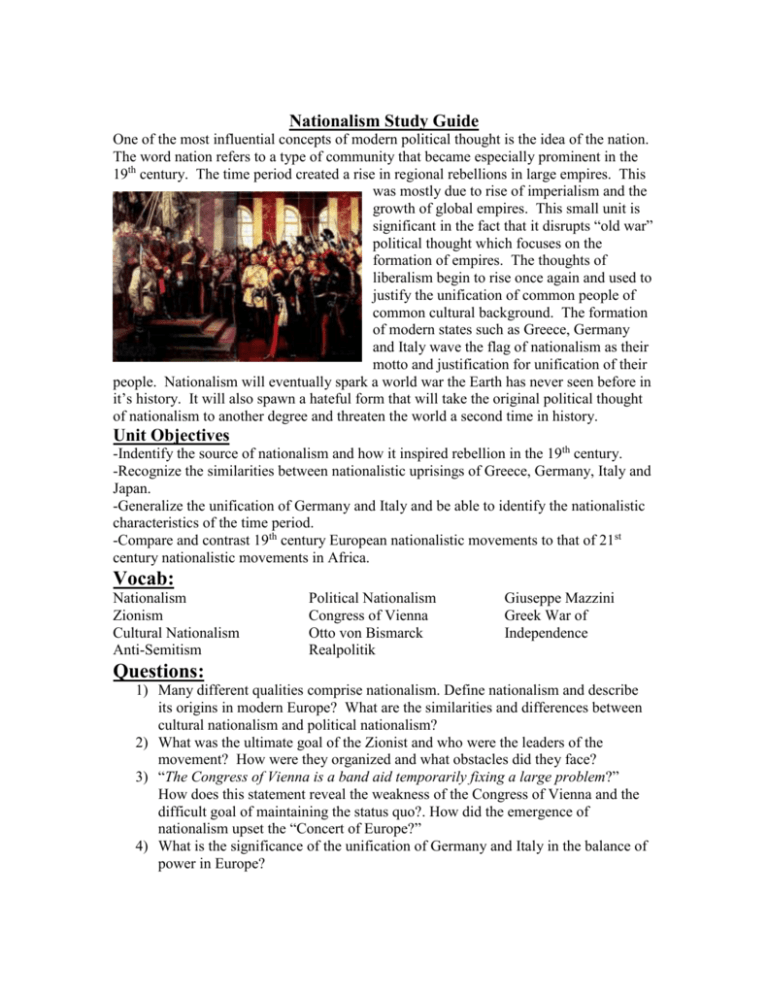
Nationalism Study Guide One of the most influential concepts of modern political thought is the idea of the nation. The word nation refers to a type of community that became especially prominent in the 19th century. The time period created a rise in regional rebellions in large empires. This was mostly due to rise of imperialism and the growth of global empires. This small unit is significant in the fact that it disrupts “old war” political thought which focuses on the formation of empires. The thoughts of liberalism begin to rise once again and used to justify the unification of common people of common cultural background. The formation of modern states such as Greece, Germany and Italy wave the flag of nationalism as their motto and justification for unification of their people. Nationalism will eventually spark a world war the Earth has never seen before in it’s history. It will also spawn a hateful form that will take the original political thought of nationalism to another degree and threaten the world a second time in history. Unit Objectives -Indentify the source of nationalism and how it inspired rebellion in the 19th century. -Recognize the similarities between nationalistic uprisings of Greece, Germany, Italy and Japan. -Generalize the unification of Germany and Italy and be able to identify the nationalistic characteristics of the time period. -Compare and contrast 19th century European nationalistic movements to that of 21st century nationalistic movements in Africa. Vocab: Nationalism Zionism Cultural Nationalism Anti-Semitism Political Nationalism Congress of Vienna Otto von Bismarck Realpolitik Giuseppe Mazzini Greek War of Independence Questions: 1) Many different qualities comprise nationalism. Define nationalism and describe its origins in modern Europe? What are the similarities and differences between cultural nationalism and political nationalism? 2) What was the ultimate goal of the Zionist and who were the leaders of the movement? How were they organized and what obstacles did they face? 3) “The Congress of Vienna is a band aid temporarily fixing a large problem?” How does this statement reveal the weakness of the Congress of Vienna and the difficult goal of maintaining the status quo?. How did the emergence of nationalism upset the “Concert of Europe?” 4) What is the significance of the unification of Germany and Italy in the balance of power in Europe? Timeline: 19th Century Europe Philosophy Visual Arts Goya (1746-1828) David (1748-1825) Delacroix (1798-1863) Degas (1834-1917) Cézanne (1839-1906) Rodin (1840-1917) van Gogh (1853-90) Lautrec (1864-1901) Literature 1807: Wordsworth - Ode, Intimations of Immortality 1808: Goethe - Faust (Pt. 1) 1818: Shelley - Frankenstein 1827: Heine - Book of Songs 1842: Gogol - Dead Souls (Vol. 1) 1853: Dickens - Bleak House 1857: Baudelaire - Flowers of Evil 1857: Flaubert - Madam Bovary 1866: Swinburne - Poems & Ballads 1877: Ibsen - Pillars of Society 1879: Dostoyevsky - The Brothers Karamazov 1883: Maupassant - A Woman's Life 1885: Zola - Germinal 1888: Bellamy - Looking Backward 1894: Wilde - Salomé Science & Technology 1800: Alessandro Volta - produces 1st electric battery 1804: Jacquard patents automatic loom 1808: John Dalton - New System of Chemical Philosophy 1809: Jean-Baptiste de Lamarck - Zoological Philosophy 1820: Hans Christian Oersted - Experiments on the effects of an electrical conflict on a magnetic needle 1821: Michael Faraday - demonstrates electrical energy can be continually converted into mechanical energy 1828: Friedrich Wöhler - synthesizes organic compound in the lab 1830: Charles Lyell - The Principles of Geology 1831: Michael Faraday - demonstrates principle of induction 1837: Electric telegraph line set up 1838-39: Matthias Schleiden and Theodor Schwann - develop cell theory 1840: James Joule - develops concept of the conservation of energy 1847: Helmholtz - On the Conservation of Force 1856: William Ferrel - Essay on the Winds and Currents of the Ocean 1859: Charles Darwin - Origin of the Species 1866: Gregor Mendel - Experiments with Plant Hybrids 1869: Dmitri Mendeleyev - Periodic Table of the Chemical Elements 1873: Maxwell - Electricity and Magnetism 1876: Koch identifies a germ connected w/ a specific disease (anthrax) 1876: Bell patents telephone [U.S.] 1876: Otto patents 1st internal combustion engine 1879: Edison creates commercially practical incandescent lamp [U.S.] 1882: Edison sets up electricity generating plant based on dynamos [U.S.] 1885: Pasteur - rabies vaccine 1893: Mach - The Science of Mechanics 1895: Wilhelm Röntgen - discovers x-rays 1897: J. J. Thomson - discovers the electron 1898: Marie and Pierre Curie discover radium and polonium Social/Political/Political Economy: Practice Various wars throughout the century Free trade (Britain) from the 1840s into the 20th century Industrial Cycles: 1st - 1780s to 1840s (textiles) 2nd - 1840s t0 1870s ((railway and iron) 3rd - (organic chemicals, steel, electrical machinery) 1804: Napoleon voted emperor 1806-22: Wars of South American Independence 1807: Great Britain prohibits slave trade 1811: Luddites attack mechanization 1814-15: Congress of Vienna 1815: Napoleon defeated at Waterloo - end of Napoleonic Wars 1824: Combination Acts repealed in England 1825: Decembrist rising against Tsar Nicholas I 1829: Catholic Emancipation Act 1830: 1st passenger railway opens 1833: Factory Act bans employment of children under 9 1833: Slavery abolished in British colonies 1848: "Year of Revolutions" 1854-56: Crimean War 1857-58: Indian Mutiny 1861: Alexander II abolishes serfdom 1861: Italy unified 1861-65: American Civil War 1864: International Workingmen's Association (1st International) founded 1871: Germany unified 1871: Paris Commune 1871: Trade unions legalized in Britain 1881: 1st pogrom (after assassination of Alexander II) 1883: Bismarck introduces sickness insurance 1884: Berlin West Africa Conference 1894: Dreyfus convicted of treason 1898: Spanish - U.S. War 1899: 1st Hague Peace Conference
